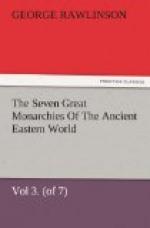According to the account of the struggle which is most circumstantial, and on the whole most probable, the first difficulty which the would-be rebel had to meet and vanquish was that of quitting the Court. Alleging that his father was in weak health, and required his care, he requested leave of absence for a short time; but his petition was refused on the flattering ground that the Great King was too much attached to him to lose sight of him even for a day. A second application, however, made through a favorite eunuch after a certain interval of time, was more successful; Cyrus received permission to absent himself from Court for the next five months; whereupon, with a few attendants, he left Ecbatana by night, and took the road leading to his native country.
The next evening Astyages, enjoying himself as usual over his wine, surrounded by a crowd of his concubines, singing-girls, and dancing-girls, called on one of them for a song. The girl took her lyre and sang as follows: “The lion had the wild boar in his power, but let him depart to his own lair; in his lair he will wax in strength, and will cause the lion a world of toil; till at length, although the weaker, he will overcome the stronger.” The words of the song greatly disquieted the king, who had been already made aware that a Chaldaean prophecy designated Cyrus as future king of the Persians. Repenting of the indulgence which he had granted him, Astyages forthwith summoned an officer into his presence, and ordered him to take a body of horsemen, pursue the Persian prince, and bring him back, either alive or dead. The officer obeyed, overtook Cyrus, and announced his errand; upon which Cyrus expressed his perfect willingness to return, but proposed, that, as it was late, they should defer their start till the next day. The Medes consenting, Cyrus feasted them, and succeeded in making them all drunk; then mounting his horse, he rode off at full speed with his attendants, and reached a Persian outpost, where he had arranged with his father that he should find a body of Persian troops. When the Medes had slept off their drunkenness, and found their prisoner gone, they pursued, and again overtaking Cyrus, who was now at the head of an armed force, engaged him. They were, however, defeated with great loss, and forced to retreat, while Cyrus, having beaten them off, made good his escape into Persia.




